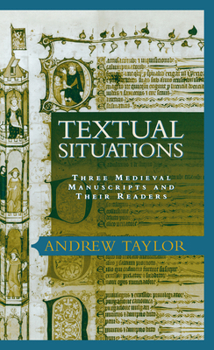Textual Situations: Three Medieval Manuscripts and Their Readers
Generations of scholars have meditated upon the literary devices and cultural meanings of The Song of Roland. But according to Andrew Taylor not enough attention has been given to the physical context of the manuscript itself. The original copy of The Song of Roland is actually bound with a Latin translation of the Timaeus.
Textual Situations looks at this bound volume along with two other similarly bound medieval volumes to explore the manuscripts and marginalia that have been cast into shadow by the fame of adjacent texts, some of the most read medieval works. In addition to the bound volume that contains The Song of Roland, Taylor examines the volume that binds the well-known poem "Sumer is icumen in" with the Lais of Marie de France, and a volume containing the legal Decretals of Gregory IX with marginal illustrations of wayfaring life decorating its borders. Approaching the manuscript as artifact, Textual Situations suggests that medieval texts must be examined in terms of their material support--that is, literal interpretation must take into consideration the physical manuscript itself in addition to the social conventions that surround its compilation. Taylor reconstructs the circumstances of the creation of these medieval bound volumes, the settings in which they were read, inscribed, and shared, and the social and intellectual conventions surrounding them.Format:Hardcover
Language:English
ISBN:0812236424
ISBN13:9780812236422
Release Date:February 2002
Publisher:University of Pennsylvania Press
Length:312 Pages
Weight:1.35 lbs.
Dimensions:1.0" x 6.3" x 9.3"
Customer Reviews
0 rating





